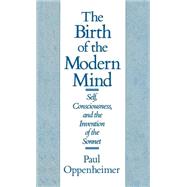
Note: Supplemental materials are not guaranteed with Rental or Used book purchases.
Purchase Benefits
Looking to rent a book? Rent The Birth of the Modern Mind Self, Consciousness, and the Invention of the Sonnet [ISBN: 9780195056921] for the semester, quarter, and short term or search our site for other textbooks by Oppenheimer, Paul. Renting a textbook can save you up to 90% from the cost of buying.
| The Birth of the Modern Mind: New Facts and a Theory | p. 1 |
| Sonnets in the European Tradition | p. 41 |
| A Note on the Translations | p. 43 |
| Italian Sonnets | |
| Giacomo da Lentino | p. 48 |
| Jacopo Mostacci | p. 58 |
| Pier della Vigna | p. 60 |
| Giacomo da Lentino | p. 62 |
| Federico II | p. 64 |
| Dante Alighieri | p. 66 |
| Francesco Petrarca | p. 70 |
| Michelangelo Buonarroti | p. 74 |
| Benvenuto Cellini | p. 76 |
| Faustina Maratti Zappi | p. 78 |
| Gabriele D'Annunzio | p. 80 |
| Umberto Saba | p. 82 |
| German Sonnets | |
| Andreas Gryphius | p. 86 |
| Gottfried August Burger | p. 88 |
| Johann Wolfgang von Goethe | p. 90 |
| August von Platen | p. 94 |
| Heinrich Heine | p. 98 |
| Ricarda Huch | p. 100 |
| Rainer Maria Rilke | p. 102 |
| Georg Trakl | p. 112 |
| Marie Louise Kaschnitz | p. 114 |
| French Sonnets | |
| Maurice Sceve | p. 118 |
| Pierre de Ronsard | p. 120 |
| Joachim du Bellay | p. 122 |
| Gerard de Nerval | p. 124 |
| Paul Verlaine | p. 126 |
| Arthur Rimbaud | p. 128 |
| Albert Samain | p. 130 |
| Paul Valery | p. 132 |
| Vincent Muselli | p. 134 |
| Spanish Sonnets | |
| Juan Boscan | p. 138 |
| Luis de Gongora | p. 140 |
| Lope de Vega | p. 142 |
| Miguel de Unamuno | p. 146 |
| Antonio Machado | p. 148 |
| Juana de Ibarbourou | p. 152 |
| Federico Garcia Lorca | p. 154 |
| Notes on the Poets and Poems | p. 157 |
| Scholarly Background: The Origin of the Sonnet | p. 169 |
| Bibliography | p. 191 |
| Index | p. 195 |
| Table of Contents provided by Syndetics. All Rights Reserved. |
The New copy of this book will include any supplemental materials advertised. Please check the title of the book to determine if it should include any access cards, study guides, lab manuals, CDs, etc.
The Used, Rental and eBook copies of this book are not guaranteed to include any supplemental materials. Typically, only the book itself is included. This is true even if the title states it includes any access cards, study guides, lab manuals, CDs, etc.